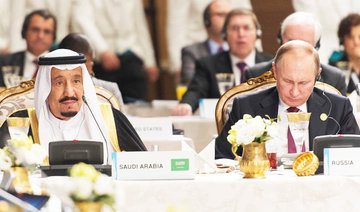MOSCOW: Saudi King Salman’s visit to Russia, which began Wednesday, represents a “real turning point in relations between the two countries,” Russian Foreign Minister Sergei Lavrov told Asharq Al-Awsat newspaper in Moscow.
He said Moscow shared Riyadh’s conviction to “further develop bilateral relations at various levels,” and to work toward regional and global stability.
Both countries have maintained high-level dialogue that has produced tangible results, he added.
“We are intensifying efforts to strengthen trade ties and humanitarian relations with the Kingdom,” Lavrov said. “Our common goal is to increase the volume of trade and expand the range of commodities.”
Russia and the Kingdom are jointly working on implementation of agreements between the Organization of the Petroleum Exporting Countries (OPEC) and non-OPEC oil producers to reduce global production, he added.
“We consider it extremely important to continue to coordinate efforts with our partners in Saudi Arabia in this regard,” Lavrov said.
He added that King Salman and Russian President Vladimir Putin will discuss the need to find sustainable and permanent solutions to ongoing crises in the region.
The visit will “take cooperation between us to a new level, achieving a fruitful contribution to stability in the Middle East and North Africa,” Lavrov said.
Asked whether a political solution to the Syrian war would be reached soon, Lavrov replied: “Since the beginning of the Syrian crisis, Russia has insisted on a solution through peaceful means by holding an extensive dialogue between the various parties. We also called on the international community to extend a helping hand to the Syrian people to end the violence and bloodshed, and to prevent the support of criminals and terrorists inside the country.”
He said: “The Arab League and many regional and international parties have taken a decision to strip Syrian President Bashar Assad of his legitimacy for a variety of reasons. In doing so, they have effectively attacked the right of the Syrian people to decide who will rule Syria and in what way. We strongly disagree with this approach.”
Lavrov added: “In various international forums, we have always supported the independence, unity and territorial integrity of the Syrian Arab Republic. We have reiterated that the fate and future of Syria must be in the hands of the Syrian people, in a fully legal manner and through national dialogue.”
He said Russia has responded to Syrian government requests to help it eradicate terrorism. “At the same time, we continue to believe that the military campaign against extremists must be accompanied by the search for a political solution to the crisis,” Lavrov added.
“To this end, we continue to fight terrorist groups, while strengthening our efforts to stop the bloodshed, provide humanitarian assistance to the population and boost the political process, as stipulated in UN Security Council resolution 2254.”
He underlined the importance of the Astana meetings on Syria, during which he said the concerned parties agreed that there is no alternative to a political and diplomatic settlement under UN auspices, and expressed their commitment to the cease-fire.
“Today, all actors must abandon their own geopolitical ambitions and contribute fully to the restoration of stability and security in Syria, and throughout the Middle East and North Africa,” Lavrov said.
Russia “attaches great importance to cooperation with Turkey and Iran as part of the settlement of the Syrian crisis and to help Baghdad face ISIS (Daesh) terrorist threats,” he added.
“We believe that joint efforts between Russia, Turkey and Iran have succeeded in improving the situation in Syria, destroying the hubs of ISIS, Al-Nusra Front and other terrorist groups, and guaranteeing conditions for a broad and constructive dialogue between Syrian parties.”
Moscow is “not to blame for the current deterioration in US-Russian relations. This is a direct result of the policies of (former President Barack) Obama’s administration, which destroyed the foundations of our cooperation.” Lavrov said.
“In addition, before its departure, the administration planted time bombs to make things more difficult for the new government.”
He said Russia “stands ready to seek new ways, in cooperation with the new US administration, to improve bilateral relations based on the principles of mutual trust and respect for each other’s interests.”
But the accusation of Russian interference in last year’s US election “clearly hampers any attempt to normalize dialogue between the two sides,” Lavrov added.
“There is an unmistakable impression that some in Washington are not happy with the way the American people have expressed their will, trying to blame us for their failures,” he said.
“We have been careful to exercise restraint, especially considering the complex reality of the internal political scene in which the new US administration must work. However, we cannot remain silent toward hostile actions,” including “imposing sanctions.”
Lavrov said there is still considerable unexploited potential for US-Russian cooperation in international affairs.
“We have long urged our counterparts in the United States to build real coordination with us in the fight against terrorism, as well as to deal with other serious challenges, such as the proliferation of weapons of mass destruction, the drug trade and cybercrime,” he added.
There are also opportunities for mutually beneficial initiatives in trade and investment, he said.
“It is remarkable that US companies attach great importance to their presence in the Russian market, and wish to participate in projects that serve the interests of both sides.”
Asked to evaluate the US-led coalition against Daesh, and the extent of Russia’s role in fighting the terrorist organization, Lavrov replied: “One should start by saying that from the perspective of the Syrians and international law, this alliance is prying on Syria. For its part, the Syrian government remains tolerant as long as coalition activities are directed against terrorists inside Syrian territory.”
He added: “In reality, it was airstrikes by the Russian air force and the Syrian Army that forced ISIS to retreat.”
Russian FM: Saudi king’s visit a ‘turning point’ in relations
Russian FM: Saudi king’s visit a ‘turning point’ in relations

Saudi Arabia condemns assassination attempt on Slovakia’s prime minister

- The ministry wished speedy recovery of the prime minister
RIYADH: Saudi Arabia on Thursday condemned the attempted assassination of Slovakia’s prime minister, Robert Fico, the foreign ministry said.
“The Kingdom rejects all forms of violence, reaffirming its full solidarity with Slovakia against everything that threatens its security and stability,” the statement read.
The ministry wished a speedy recovery for the prime minister, who remains, according to his deputy, in a “very serious condition” after the attack in Handlova.
Fico was admitted to hospital on Wednesday where he underwent a five-hour emergency surgery after being shot five times.
The shooting was the first major assassination attempt on a European political leader for more than 20 years, and drew international condemnation, with political analysts and legislators saying it was indicative of an increasingly febrile and polarised political climate across the continent.
Saudi Arabia, Iraq sign pact to counter money laundering, terrorism

RIYADH: The Kingdom and Iraq have signed an agreement to counter money laundering and terrorism, the Saudi Press Agency reported on Thursday.
The pact was signed between the General Directorate of Financial Investigation at the Presidency of State Security and the Anti-Money Laundering and Countering Financing of Terrorism Office of the Republic of Iraq.
The agreement was inked on the sidelines of the Arab Forum of Anti-Corruption Agencies and Financial Intelligence Units in Riyadh.
French pilgrim walks through 13 countries to perform Umrah
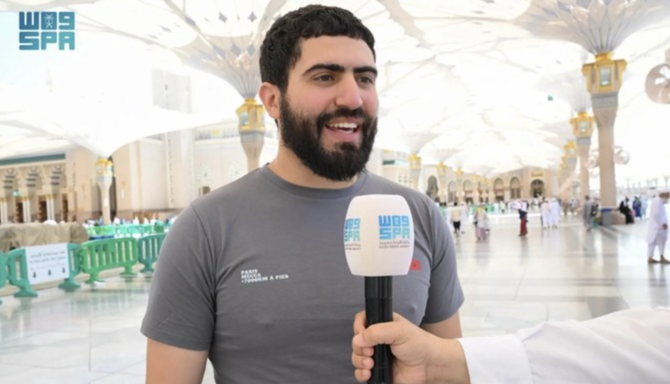
- Currently in Madinah, he is now preparing to walk to Makkah
MADINAH: French traveler Mohamed Boulabiar spent eight months walking through 13 countries to perform Umrah, the Saudi Press Agency reported on Wednesday.
In an interview with the SPA shortly after arriving in Madinah on Wednesday, Boulabiar said he trained for two years for the 8,000-km walk.
He started in Paris on Aug. 27, 2023, and walked through Switzerland, Italy, Slovenia, Croatia, Bosnia, Montenegro, Albania, Macedonia, Greece, Turkiye and Jordan before eventually reaching Saudi Arabia.
With only a map and a bag containing essential provisions and a tent weighing only 25 kg, Boulabiar said he spent most of his nights at mosques along the route or with generous strangers who welcomed him into their homes.
Boulabiar said the hardest part of the journey was the weather.
“I departed in the summer and arrived in the spring, passing through autumn and winter, enduring storms and thunder. At one stage of the journey, a snowstorm at the Greek border delayed my trip by a week,” he said.
“It has been a dream since childhood. I yearned to arrive in Makkah on foot, emulating the prophet,” said Boulabiar.
Arab League Educational, Cultural and Scientific Organization session concludes in Jeddah

- Organization’s director general tells Arab News about its future plans and how it addresses current events and needs in the Arab world, including the crisis in Gaza
- Other topics discussed during the 121st session of the organization’s Executive Council include efforts to preserve Arab heritage, the effects of AI, and educational initiatives
JEDDAH: The 121st session of the Executive Council of the Arab League Educational, Cultural and Scientific Organization concluded in Jeddah on Wednesday.
During the two-day event, ministers and other representatives from 22 Arab nations discussed important topics, initiatives and proposals related to knowledge sharing, scientific advancement, and innovation within the framework of the work of the organization. It will be followed on Friday by its General Conference.
In an exclusive interview with Arab News on Wednesday, Mohammed Walad Amar, the director general of the organization, said: “The aim of this conference is to approve the organization’s budget for the next two years and to endorse its selected projects based on the proposals and needs of Arab countries, envisioning a real acceleration toward the goals of our Arab nations in the fields of education, culture and information technology, as well as in various areas prioritized by Arab countries in cultural and educational work.”
Addressing the crisis in Gaza, Walad Amar said the organization condemned what is happening there and called for support for Palestinians in the fields of the education and culture.
“The organization sees this aggression not only as an attack on the (Palestinian) people but also as an assault on Arab identity in general, and an assault on the Palestinian educational approach,” he added.
A key aspect of ALECSO’s cultural activities and initiatives, Walad Amar said, is its submissions to the UN Educational, Scientific and Cultural Organization with the aim of preserving Arab culture and heritage through inclusions on the Intangible Cultural Heritage list.
“To date, we have successfully accredited the initial submissions concerning the palm tree, Arabic calligraphy, traditional clay architecture, metal engraving and wedding customs,” he said.
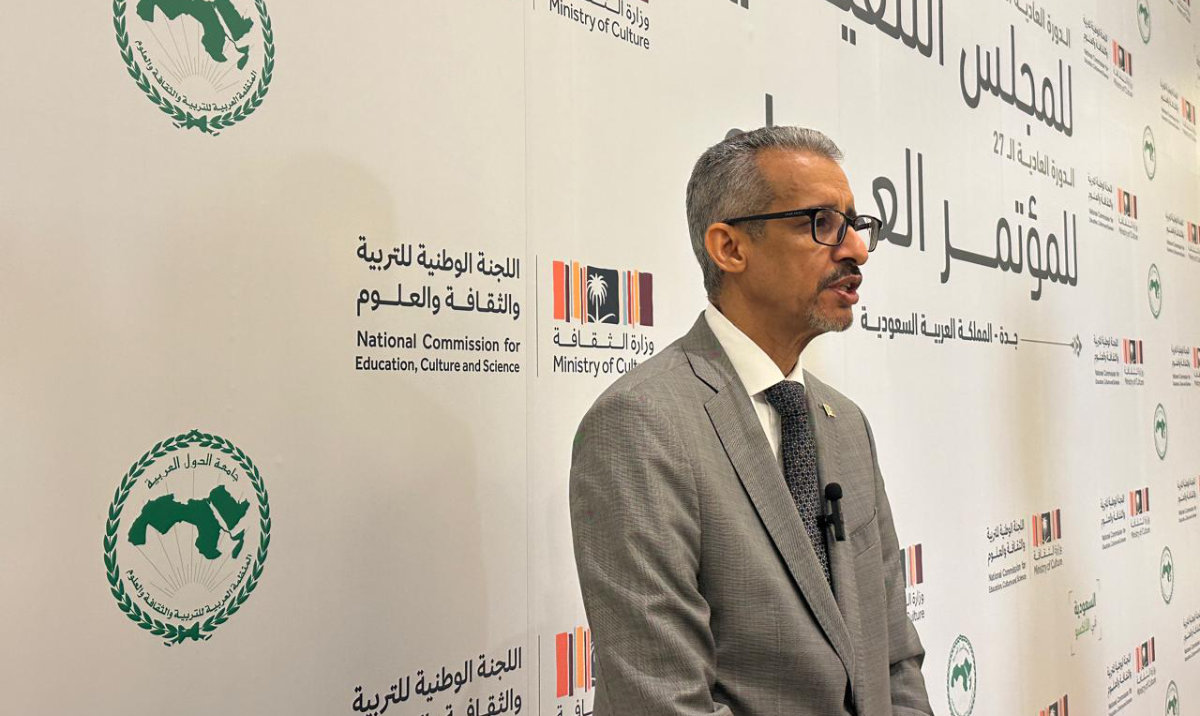
“Our approach aligns with the Arab strategy, which prioritizes both tangible and intangible cultural heritage, fostering awareness across Arab nations about its significance.”
These efforts are complemented by educational programs, Walad Amar said.
“Given the current landscape, our primary challenge lies in revising curricula to reflect present realities and anticipate future needs,” he added.
ALECSO recently staged the fourth Arab Programming Week at King Salman Global Academy for Arabic Language, which was attended by about 250 teachers from Arab countries. The organization has also created a guide for teaching students in Arab primary and secondary schools about artificial intelligence and is developing an Arab charter for the ethical use of AI.
“We recognize the inevitable influence of artificial intelligence and the challenges it presents,” Walad Amar said.
“While embracing its advancements, we prioritize safeguarding the privacy of our Arab nations. Our aim is to harness the positive aspects of AI while avoiding any negative impacts. Achieving this requires strengthening our educational systems to equip our children with the necessary skills and awareness.”
Two topics discussed during the Executive Council session that were described as particularly significant were the establishment of an ALECSO Partnership Forum, which was initiated by the Kingdom, and an Arab Cultural Week within UNESCO, both of which received unanimous approval.
“The Kingdom consistently presents us with positive and constructive initiatives that unite Arab educational and cultural efforts across various scientific fields,” Ahmed Sameer, the assistant secretary-general of the Yemeni National Commission for Education, Culture and Science, told Arab News.
Issam Louhichi, who oversees operations at the National Commission for Education, Science and Culture in Tunisia, told Arab News that a consensus on ideas during the two-day session meant that a number of decisions were quickly agreed.
“It provided an opportunity to practice democracy within our Arab world through voting on resolutions and exchanging successful experiences in various educational, scientific, and cultural fields,” he added. “This Executive Council serves as an opportunity to present proposals from countries, with the aim of including them in the General Conference agenda (on Friday).
“It was an excellent opportunity to discuss the core issue of Palestine by presenting several proposals. Algeria proposed integrating lessons within educational curricula across Arab countries each year to educate youth about the history and justice of this issue.”
“Today, we were presented with a proposal from the Kingdom of Saudi Arabia regarding the Arab Cultural Week at UNESCO. This initiative, which involves all Arab countries, including Tunisia, aims to foster collaboration and ensure its success. We will contribute diverse insights and experiences spanning cultural, historical, educational and scientific domains.”
Other topics discussed during the two-day session, which was hosted by the Saudi National Committee for Education, Culture and Science, included the challenges that Arab nations face in the fields of education, culture and science, innovative solutions to those problems, and ways to forge new partnerships that can broaden the horizons of for education and creative thought.
Saudi institute gears up to tackle organized crime

- Riyadh forum pushes for stronger global efforts to combat financial crimes
RIYADH: Legal enforcement agencies must outperform organized crime groups by “miles, not just steps,” to prevent criminal alliances forming and flowing across borders, a major Riyadh forum on combating corruption has been told.
In a speech on “Building Human Capabilities to Fight Corruption and Fraud” delivered at the Arab Forum of Anti-Corruption Agencies and Financial Intelligence Units on Wednesday, Abdulmajeed bin Abdullah Al-Banyan, president of Naif Arab University for Security Sciences, said that developing strategies to fight organized crime “presents a significant challenge for both the creators and enforcers of these initiatives.”
He added: “They must ensure that the individuals they train will gain superior knowledge and skills compared to even the most adept criminal organizations as the crimes in question are intricate in nature, often orchestrated by sophisticated transnational gangs that leverage cyberspace and technology to perpetrate their illegal activities while evading detection.”
Organized crime encompasses terrorist groups, drug trafficking, money laundering, migrant smuggling, and human trafficking.
Naif Arab University for Security Sciences examined specialized training programs in the field of economic crime as part of a survey of the Arab region in 2018 .
“We noticed a shortage in the number and type of programs available compared with other regions of the world,” said Al-Banyan.
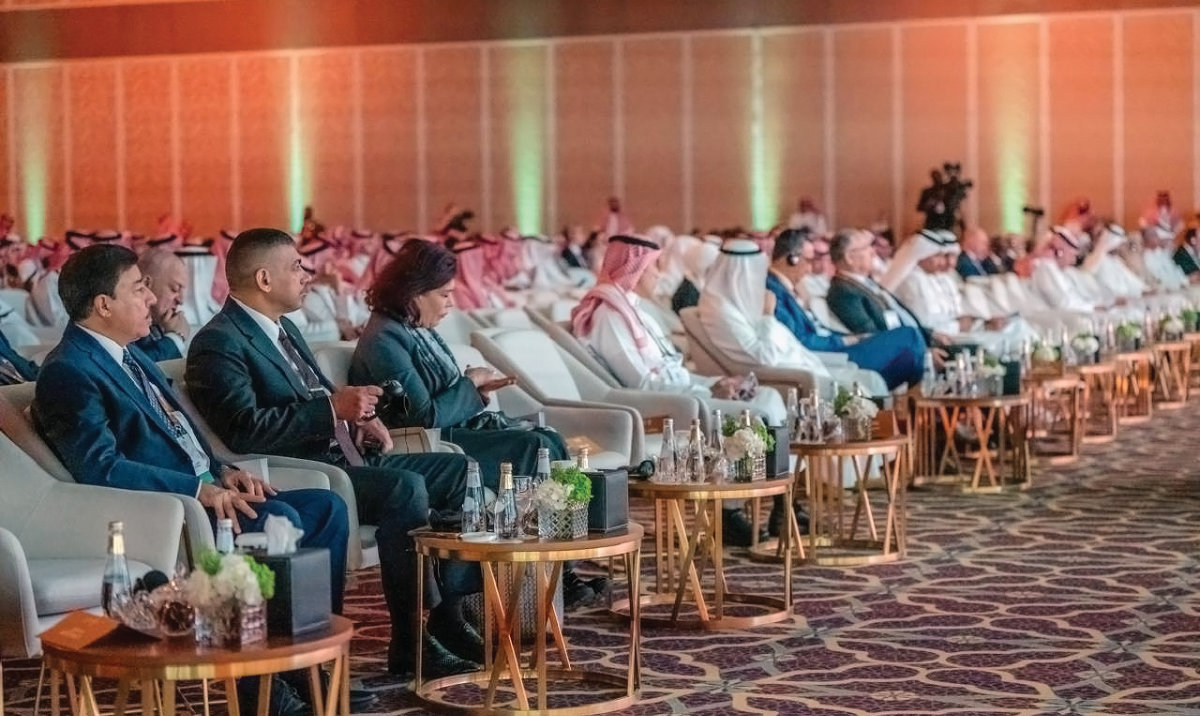
As a result, the university — the scientific body of the Arab Interior Ministers Council — made fighting economic crime one of its main priorities.
“We launched several master’s programs aimed at building capabilities in this field, the most important of which is the master’s program in financial integrity in cooperation with Case Western Reserve University in the US, which specifically aims to prepare experts in combating money fraud,” he said.
The university provides a master’s program in dealing with economic crimes, including corruption and financial fraud, and a master’s program in digital forensic investigation, which focuses on combating cybercrime and suspicious activities online.
NAUSS also launched a new master’s program in artificial intelligence this year, Al-Banyan said.
“We are currently considering adding a new master’s program in forensic accounting, which aims to qualify accountants to detect fraudulent financial practices, and qualifies them to conduct detailed financial investigations and reviews,” he added.
The university signed a memorandum of understanding with the Presidency of State Security in 2016 as part of its efforts to increase its work with key local and international partners.
“We strengthened our relations with the Oversight and Anti-Corruption Authority (Nazaha), and today, we will witness the MoU signing on the sidelines of this forum,” he added.
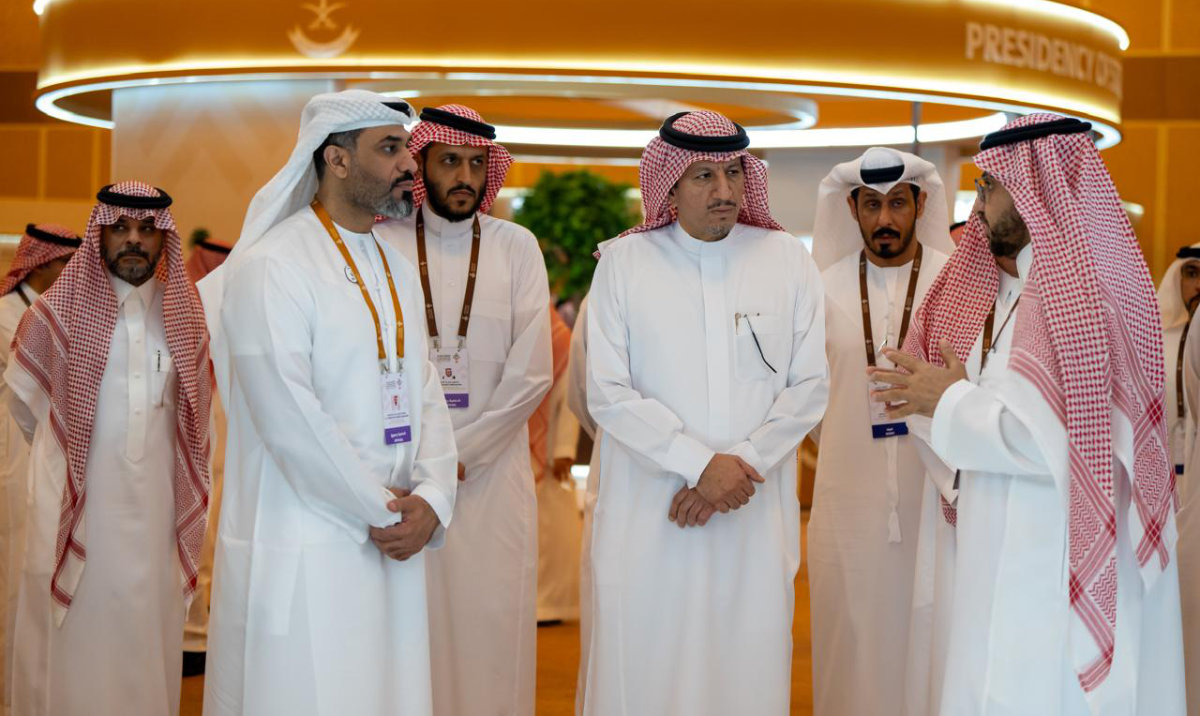
The university has partnered with the United Nations Office on Drugs and Crime, establishing a joint center at its headquarters to support the international and Arab community in combating organized crime, corruption, and money laundering.
Experts highlighted that fighting economic and financial crimes is a complex task that requires clear national strategies and effective cross-border cooperation.
Countries must work together to counter the threat posed by such crimes, which have the potential to severely damage economies and undermine financial systems.
Hassan Mohamud, Somalia’s Minister of Justice and Constitutional Affairs, told the forum that continuing conflict in Somalia has created a “complex money laundering landscape,” making international cooperation crucial for identifying and returning illicit funds.
Speaking during a panel session on “Enhancing Cross-Border Enforcement and Asset Recovery Mechanisms,” Mohamud said that judicial cooperation between countries, and the public and private sectors, is key to addressing these evolving issues.
“The need for sharing information on cross-border flows of money is important to combat money laundering effectively not just in Somalia, but globally,” he said.
In a keynote speech on “National Strategies: Risk Assessment in the Light of Rapidly Changing Realities,” Raed Radwan, head of the Palestinian Anti-Corruption Commission, said: “A national strategy directs efforts and resources fairly and effectively toward achieving specific goals to reduce financial crimes, and enhance integrity and transparency in the financial and economic system.”
He added that citizens have an important role to play in monitoring and reporting crimes, and raising awareness of likely threats.
“Reinforcement training is an awareness-raising activity usually supported by national strategies. It is not limited to employees, but should be available to citizens who wish to acquire knowledge to protect them and make them partners in combating these crimes,” he said.
National strategies also must include a continuous assessment of the risks surrounding financial crimes.
“This basis for evaluation can provide stakeholders with a view of the developments that perpetrators of financial crime can resort to or already resort to,” he said.
Radwan added that political and economic stability are key factors when it comes to halting the rise in financial crimes, which is evident in unstable countries.
“Financial crimes erode trust, affect economic and financial systems, leading to instability in the market, decreased investments, and hindered economic growth, resulting in financial crises,” he said.
Combating corruption and financial crimes is not the task of institutions based on and mandated by law, but is a participatory community task in which various societal sectors participate, Radwan said.



